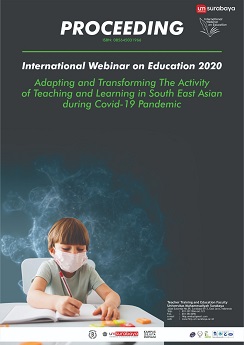The Transformation Of Learning During Covid-19 Pandemic Towards The New Normal Era
Abstrak
Abstract. The purpose of this literature review is to describe the transformation in learning that occurred during the Covid-19 pandemic. The planned learning transformation process includes the transformation of the use of learning technology and learning media in distance learning, transformation of learning designs, transformation of learning models and transformation of learning assessments so that learning remains effective and efficient. In the transformation process, there are several learning problems, including: teacher and student competencies to use technology are still weak and learning facilities and the internet are not evenly distributed. The good impact of the Covid-19 pandemic is the ability of educators and students to grow well. Educators and students are "forced" to teach and learn using available learning technologies and platforms. Parents participate in children's home orientation in the areas of financial and emotional support, monitoring studies, advice and material support. In addition, this learning transformation can still continue to welcome a new normal era filled with virtual technology. Blended learning and distance learning will be a necessity to meet the future of education.
Keywords: transformation of learning, covid-19 pandemic, new normal
Referensi
E. D. Sihaloho, ―Dampak Covid-19 Terhadap Perekonomian Indonesia,‖ no. April, 2020.
H. Khairiansyah, ―Strategi Transformasi dan Tradisi Pembelajaran dalam Model Integrasi Manajemen Kurikulum Pendidikan Islam (Studi Kasus di SMA Ar-Rohmah Dau Malang),‖ Thesis, No Publ., 2018.
A. Samsudin, ―Transformasi Pembelajaran di Pendidkan Non Formal (Upaya mempersiapkan pendidik dan peserta didik dalam menghadapi tantangan global untuk menjadi manusia pembelajar),‖ vol. 2, no. 2252, pp. 1–15, 2013.
S. Luthra, Poornima & Mackenzie, ―4 ways COVID-19 could change how we educate future generations,‖ 2020.
D. Tam, Gloria & El-Azar, ―3 ways the coronavirus pandemic could reshape education,‖2020.
A. R. E. D. Nugraheni, ―Pengaruh Penerapan Pembelajaran E-learning terhadap Kemandirian dan Minat Belajar Mahasiswa pada Mata Kuliah Wawasan dan Kajian
MIPA,‖ vol. 9, no. 1, pp. 111–116, 2017.
A. Ratnasari, ―Studi Pengaruh Penerapan E-learning terhadap Keaktivan Mahasiswa dalam Kegiatan Belajar mengajar Studi Kasus Universitas Mercu Buana Jakarta,‖ vol. 2, no. 2, pp.15–16, 2012.
I. Munawaroh, ―Virtual Learning dalam Pembelajaran Jarak Jauh.‖ 2005.
N. Septantiningtyas, ―Pengaruh Pembelajaran Jarak Jauh dengan Aplikasi Google Class terhadap Hasil Belajar Mahasiswa,‖ vol. 2, no. 2, pp. 1–5, 2019.
A. Y. L. Hatip, ―Minat, Kemandirian dan Hasil Belajar Mahasiswa Pendidikan Matematika dalam E-Learning Berbasis Edmodo,‖ vol. 8, no. 3, pp. 485–496, 2019.
S. Kartikawati and H. Pratama, ―Pengaruh Penggunaan WhatsApp Messenger Sebagai Mobile Learning Terintegrasi Metode Group Investigation Terhadap Kemampuan Berpikir
K,‖ vol. 2, no. September, pp. 33–38, 2017.
M. Multazam and K. Gunawan, ―Konsep Pengembangan Pembelajaran Kolaboratif
Berbasis Mobile Learning,‖ vol. 7, no. 2, pp. 18–23, 2018.
I. M. Ramadhani, ―Efek Model Pembelajaran Berbasis Proyek dengan Strategi Think Talk Write dan Kreativitas Ilmiah terhadap Hasil Belajar Kognitif Tingkat Tinggi Siswa SMA pada Pelajaran Fisika,‖ Dikfis, vol. 4, no. 1, pp. 17–24, 2015.
Sunandar, ―Pengaruh Penilaian Portofolio dan Kecerdasan Emosional terhadap Hasil Belajar Matematika Topik Dimensi Tiga Siswa kelas X SMA Negeri 4 Kendari Tahun 2006,‖ Semnas Mat. dan Pendidik. Mat. 2008, pp. 281–299, 2008.
L. D. Anggreni, I. N. Jampel, and K. S. Diputra, ―Pengaruh Model Project Based Learning Berbantuan Penilaian Portofolio Terhadap Literasi Sa,‖ vol. 25, no. 1, pp. 41–52, 2020.
B. J. Hoskins, ―Is Distance Learning Transformational ?,‖ vol. 61, no. 1, p. 7363, 2013.
N. Batang, ―Pengaruh Penggunaan Internet Sebagai Sumber Belajar Terhadap Motivasi Belajar Siswa SMTK Long Bia Kecamatan Peso Kabupaten Bulungan Provinsi Kalimantan
Utara,‖ pp. 0–4, 2017.
L. C. Cynthia, T. Martono, and M. Indriayu, ―Pengaruh Fasilitas Belajar dan Motivasi Belajar terhadap Prestasi Belajar Mata Pelajaran Ekonomi Siswa Kelas XI IIS dI SMA Negeri 5 Surakarta Tahun Ajaran 2015/2016,‖ 2016.
W. E. Zepiliana, ―Analisis Pengaruh Pemanfaatan Teknologi Informasi, Budaya Akademik dan Kompetensi Dosen terhadap Kinerja Jurusan/Program Studi di Universitas Diponegoro,‖ pp. 1–11, 1993.
Alfikalia, ―Keterlibatan Orang Tua dalam Pendidikan Mahasiswa di Perguruan Tinggi,‖INQUIRY, vol. 1, 2017.
U. A. Chaeruman, ―Designing Blended Learning Model,‖ pp. 399–409, 2013.
K. Thorne, Blended Learning : How to Integrate. 2003.
B. H. Khan, ―Managing E-Learning Strategies :,‖ no. April, pp. 1–2, 2005.
I. C. Bonk, C. Graham, and C. Graham, ―Innovations Strategist, Sun Knowledge Systems, Sun Microsystems 2.3 Putting Customers First — Blending Learning Capabilities with Customer Needs; Lutz Ziob, General Manager of Microsoft Learning, Bob Mosher, Director, Learning and Strategy Evangelist,‖ 2004.
Y. Iwai, ―Online Learning during the COVID-19 Pandemic,‖ pp. 1–4, 2020.
W. Bao, ―COVID-19 and online teaching in higher education : A case study of Peking University,‖ no. March, pp. 113–115, 2020.
J. W. Moravec, ―Paper International education in the era of COVID-19 : Making learning visible,‖ vol. 8, no. 1, pp. 38–42, 2020.






